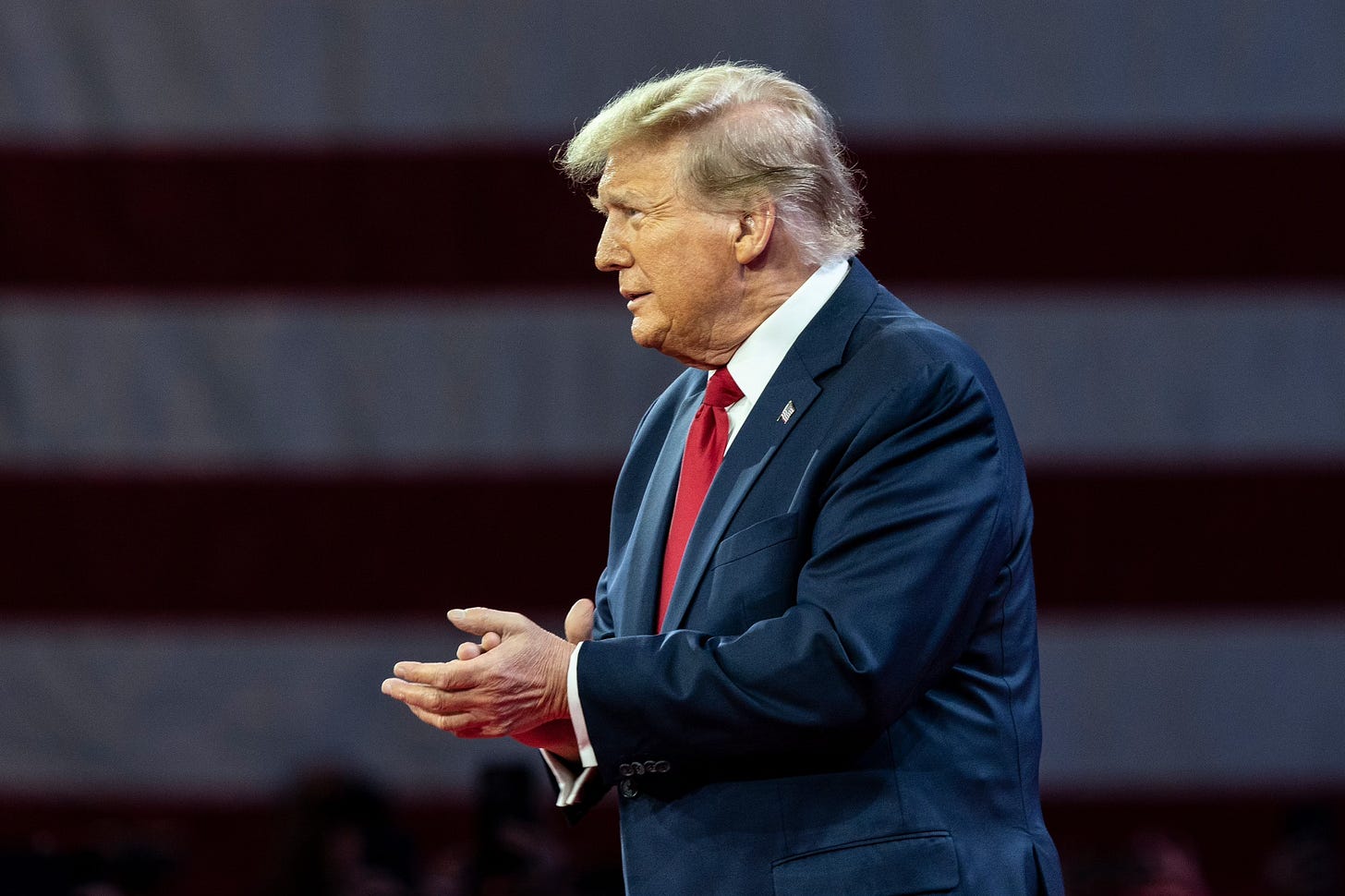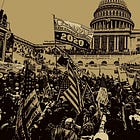Trump Is Not Preparing to Challenge the Election Results if He Loses but Mount Another Coup
He is fundamentally lawless and wants to play by no rules whatsoever
In 1801, when President John Adams peacefully accepted defeat and ceded power to the winner of the prior year’s election, his partisan opponent Thomas Jefferson, it established a model for how electoral contests, even sharply divided ones, would conclude in our burgeoning republic. It was, substantially, the first time anything like it had ever happened. Over time, as elections attracted novel challenges of various sorts—such as the 1876 presidential contest—Congress and the states passed new legislation, and sometimes constitutional amendments, and courts provided rulings that accumulated in more procedural certainty. For the most part, we got by without triggering very many electoral crises thanks to candidates of all political affiliations following longstanding norms. We can no longer take those norms for granted.
Donald Trump’s avowedly anti-democratic stance, in both the previous election and this one, isn’t grounded in serious arguments about flaws in our electoral processes, or fairly arguable legal disputes. He rejects the premise, root and branch, that voters should ultimately be able to go with someone else instead, and that his power should be checked in any way by the rule of law. He is not running for president, he is running for dictator.
Trump and allies filed over 60 lawsuits in 9 different states after the 2020 election—none with any merit. When legal efforts weren’t leading anywhere, he resorted to fraud and then to violence. And if things don’t go his way on Nov. 5, he’s likely to attempt even more of the same. But we should resist treating his electoral challenges with a legitimacy they don’t possess. We shouldn’t normalize what is essentially a repudiation of our democracy, not a good-faith challenge to the accuracy of vote totals or our election processes.
These are not just questions of law, with answers to be found in the Constitution and statutes and court rulings. They are an attack on our fundamental political philosophy as a nation, the principles of the Declaration of Independence.
Trump’s Election Claims Aren’t Genuine Legal Challenges
Today, largely in response to the turmoil following the 2020 election, the legal architecture around election disputes has become more robust. The Electoral Count Reform Act (ECRA), which passed with bipartisan support in 2022, tightened the procedures for certifying presidential results, ensuring that no vice president or rogue state officials can obstruct the will of the voters. Some states have also taken measures to shore up weak points in the administration and certification of their election results. But while the law has evolved, the fundamental reality hasn’t changed. No recount or post-election lawsuit is capable of flipping a presidential election unless the apparent margin of victory is razor-thin—as in, no more than a few hundred votes in a decisive swing state.
Of course, the arguments advanced in the aftermath of the 2020 election were completely spurious, both factually false and legally baseless. Voting machines did not alter the count. Trump’s claims of millions of illegal votes were made up out of thin air. Changes made to accommodate the pandemic were lawful, and upheld by the courts, and happened in states Trump won as much as those he lost. Nor did botched social media policies about Hunter Biden’s laptop affect the outcome, not that such a thing could be legally relevant anyway. State legislatures do not have the power to overturn presidential election results. Neither do governors and secretaries of state have the power to refuse certification. The fake electors scheme was completely bogus, and the conspirators who instigated the attempt knew it. The last-ditch litigation by Texas suing Pennsylvania and other swing states won by Biden was so frivolous the Supreme Court refused to even hear it. Mike Pence did not have the power to change the result, and neither did Congress under the circumstances. And yet, most of these same lies are being repeated now.
The groundwork being laid for Trump to overturn a defeat, if he is in fact defeated, is far more ambitious than any sincere dispute over a genuinely close outcome. These attempts cannot be reduced to mere creative lawyering, or trying to find the right legal loophole. Treating them as such, even in rebutting them, grants these schemes a patina of legitimacy they do not deserve. They are pure lawlessness. Like the attempt to overturn the last election, which Joe Biden won by tens of thousands of votes across multiple states, these plans are not pursuing any colorable legal theory. They are a criminal conspiracy—as one federal judge put it: “a coup in search of a legal theory.”
History tells us that only a tiny fraction of post-election disputes succeed in changing the result. Even the most contentious recounts and post-election litigation—the kinds that involve magnifying glasses and disputed chads—have moved the needle by only a few hundred votes at most. The idea that tens of thousands of ballots could be invalidated or reallocated through the courts is pure fantasy. Courts are structured to resolve minor disputes over specific ballots or procedural questions, not to nullify the collective decision of millions. The notion that litigation might reverse a clear election result misunderstands both the law and the practical mechanics of the process.
Recounts Adjust, They Don’t Overturn
Recounts exist to correct small errors, not to rewrite history. When every vote is recounted, slight adjustments are inevitable, but they are typically minor—a handful of votes here, a few miscategorized ballots there. In highly unusual cases, the final tally shifts by a few hundred votes, but even that is the upper limit. Often it’s less that; a recent statewide recount in Washington, where the candidates were initially separated by only 53 votes, ended up moving the margin by just two votes. The reality is that modern voting systems and election administration methods, despite their imperfections, are remarkably accurate. They are designed to withstand the occasional human error or technological hiccup without compromising the overall result.
Even if a court finds evidence of localized errors or irregularities, the remedy is proportional to the scope of the problem. If some ballots are misread or reported incorrectly, the solution is to correct the mistake—not to invalidate thousands of legitimate votes. Legal challenges that aim to disqualify broad swaths of the electorate or overturn certified results require proof of systemic failures or outright fraud on an extraordinary scale.
The very few instances of willful organized fraud on a sufficient scale to invalidate an election result have involved actually proving, directly and by substantial evidence, that vote-tampering happened in numbers significant enough to overturn an already-narrow margin. No state was that close or presented any such evidence in 2020, and while it’s always possible, it’s unlikely 2024 will, either. A look at one of the rare cases where a modern election result has been overturned puts into context how high that bar is.
The Carolina Case
In North Carolina’s 9th congressional district, the 2018 election was overturned and a new election ordered (which is not a possibility in a presidential race). Republican Mark Harris, on the initial tally, was ahead by 905 votes. But then evidence emerged that a Harris campaign operative had engaged in a scheme to fake thousands of ballots, and also to illegally “harvest” and destroy a similarly large number from African-American voters. The re-run was won by another Republican, Dan Bishop. (As an aside, Bishop is stepping down to run for state attorney general this year. Harris is the GOP nominee to replace him, and likely to win after the district was redrawn to be safely Republican. A party with a professed interest in “election integrity” can be rather selective about that, as it turns out.)
North Carolina’s criminally botched 2018 congressional election shows the high hurdle an election dispute must clear. Even with the result being tainted by misconduct on an unusually large scale, and with the culprits having been caught red-handed, that alone wasn’t enough. If the originally reported margin had instead been in the five figures, the fraudsters still would have faced serious criminal consequences, but the result likely would have stood.
These constraints on recounts and litigation are not accidental. They are built into the system to prevent elections from becoming endless legal battlegrounds. Our approach strikes a balance between offering recourse for electoral review while remaining sensitive to the need to avoid interminable delays. Allowing open-ended disputability would effectively turn a democratic process into an opaquely legal one—the same way that allowing referees during a sports match to review a call for hours would turn an athletic event into something else entirely. The point of democracy is that, once all the votes are counted and reviewed, the lawful result stands—whether the margin is 10 votes or 10,000. This resilience is one reason American elections work as well as they do: they offer finality, with the promise that there will always be a next election.
The Myth of Widespread Fraud
Donald Trump and his allies, including X owner Elon Musk and Speaker of the House Mike Johnson, have been busily pushing the idea that non-citizens are voting in large numbers and tipping elections. There is no evidence to support this claim, but that hasn’t stopped them from using it as a rallying cry. It is worth being blunt: the idea that there is widespread voter fraud going on is an utter myth. Exhaustive investigations by election officials, courts, journalists, and independent watchdogs have consistently found that improper voting happens at rates so low as to be statistically irrelevant. Georgia, for example, identified a small number of incorrect registrations, but could not identify a single non-citizen who’d actually cast a ballot.
Even in the few cases where non-citizens or ineligible voters have cast ballots, the numbers are minuscule. Isolated instances, often the result of confusion rather than malice, and which involve members of both parties, are not sufficient to swing a presidential election. In the vast majority of elections, the margin of victory is measured in thousands of votes or more, far beyond the impact of any sporadic irregularities. In a system where more than 158 million votes were cast in 2020, a number likely to be greater this year, some errors are inevitable, and yet the number of provable cases is astonishingly few. But the purpose of these fraud claims is not to address a real problem; it is to provide a pretext for overturning accurate results.
This narrative is not just about casting doubt on election outcomes, it is about laying the groundwork for rejecting the possibility of losing an election altogether. Trump’s playbook isn’t to prove fraud under any existing law—it is to create a cloud of suspicion, enough to justify extraordinary measures. The point is not to win by the rules, but to convince supporters that the election was stolen, regardless of the evidence, and that a possible Democratic victory can’t be legitimate.
Legal Arguments Are a Smokescreen for Extra-Legal Goals
There is a risk in treating these fraud claims as if they were real legal arguments that merely need to be rebutted. The rhetoric about stolen elections is not a genuine legal dispute but an attempt to construct a pseudo-legal cover for destroying our representative system of government altogether. It is a strategy designed to justify extra-legal actions—essentially another coup attempt. At the most extreme, such calls are deliberate incitement to violence, which is hardly a hypothetical concern when Trump has previously done exactly that.
Responding to these claims requires more than technical legal arguments. It requires a recognition that the challenge isn’t just about a particular election; it is about the legitimacy of the democratic system itself. Democracy rests on the premise that the outcome of an election—win or lose—will be respected. This is how elections serve to channel what would otherwise be violent social conflicts into a peaceful, orderly mechanism. When one side refuses to accept the possibility of losing fair and square, the issue is no longer about recounts or lawsuits or statutory interpretation. It becomes a direct challenge to the principle that elections are the legitimate means of determining political power in our society.
The question isn’t whether our institutions such as Congress and the courts will follow the law. In all likelihood, both will, even with possible narrow Republican majorities and an increasingly partisan Republican majority on the Supreme Court. The question is whether those who refuse to accept the results will use unlawful, anti-constitutional means to impose their will. Trump’s rhetoric, like that of authoritarian leaders throughout history, seeks to create the appearance of ambiguity where none exists. Claiming the mantle of legal legitimacy, even when it’s a sham, is still necessary to rally people to his side. But in reality, there is no ambiguity. The 2024 election, like every other election, will have clear rules, clear results, and in all likelihood, a clear winner. Whether those results are respected is the true test of our democratic resilience.
Defending Democracy Requires More Than Legalism
The Electoral Count Reform Act and other legal safeguards are important. Along with many others, I’ve worked on such reforms over the past four years. But they are not enough. Defending democracy is not just about following procedures; it is about affirming the values those procedures are meant to protect. The peaceful transfer of power is not just a technical detail—it is a moral commitment to the idea that political disagreements are resolved through elections, not force.
The danger is not that our constitutional branches of government will follow the law to a result which is at least procedurally correct even if substantively flawed. It is that political actors will seek to nullify that process entirely. Trump’s strategy is not to win within the rules but to convince his supporters that the rules don’t matter. The challenge, then, is not merely to argue about vote counts and court rulings but to reaffirm the fundamental principle that, in a democracy, elections matter. The outcome, once determined, must be respected—even when it doesn’t go your way. The message to those who would indulge election subversion must be that the rest of the country will not accept playing a game of heads we win, tails you lose.
Our task is not just to prepare for legal battles over specific ballots or recounts. It is to reject the entire premise that elections are only legitimate when the “right” side wins. At the end of the day, the integrity of the 2024 election will rest on the willingness of politicians and citizens alike to honor the result, regardless of their personal preferences. That is not a question of law; it is a question of commitment to the first principles of our republic.
© The UnPopulist, 2024
Follow us on Bluesky, Threads, YouTube, TikTok, Facebook, Instagram, and X.
We welcome your reactions and replies. Please adhere to our comments policy.









Trump declares in advance that he will regard a loss as illegitimate ("The only way they can win is by cheating"). It's obviously a manifestation of his narcissistic pathology -- which won't accept that he could ever not be the winner of everything - encouraged by the teaching of Roy Cohn: "Always claim victory, never admit defeat. Attack, attack, attack."
Most people probably don't know about the Roy Cohn doctrine, but the extreme narcissism is impossible to miss. I suspect that some Trump apologists know deep down that it's the real basis of his "stolen election" claims, but they found it useful to their purposes to pretend that their political enemies have corruptly robbed them of victory -- and then use it as a pretext to cook up their own corrupt schemes to "fight back."
While it is refreshing to read what happened on January 6th accurately described as an attempted coup, can we please call the "fake electors scheme" what it really was? It was election fraud, pure and simple.